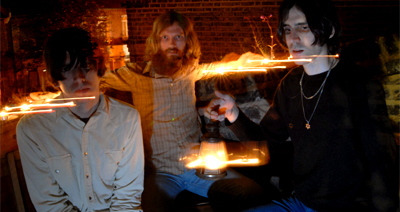Ex-Everybodyfields Singer/Songwriter Delivers First Solo Record... and Baby
By Andrew Clayman
Published in The Metro Pulse, November 2009

It’s only been about a year and a half since I last spoke with Knoxville’s resident nightingale Jill Andrews, but it’s safe to say we’ve both come a long way since then. For my part, I finally retired my favorite pair of sneakers and upgraded to a slightly more snug-fitting Converse brand. Not to be outdone, Jill countered by leaving her old band behind, getting married, having a baby, starting a solo project with a new crew of musicians, writing and producing her debut EP, and performing at the Tennessee Theatre with Willie Nelson. Hey, we all move at our own pace.
“I still feel like the same old girl,” says Andrews, 29, whose heartbreaking voice certainly ranks among the purest in the Americana genre. “Sometimes, I feel awfully young to have a baby and all these responsibilities. I was footloose and fancy-free not too long ago, you know? [laughs] But everything is so good right now. I’m really happy, my husband is really happy, the baby is really happy—it’s just been a great time.”
Andrews realizes that all this happiness stands in stark contrast to our previous interview, when she and ex-boyfriend Sam Quinn were still struggling to determine if their musical partnership as the acclaimed Everybodyfields could outlive their failed romantic one. This past summer, their best efforts finally hit the proverbial wall, as the band’s six-year run came to an official end.
“It wasn’t one particular thing really that ended it,” Andrews says. “It was a lot of little things built up over a long period of time. Finally, it was just like, ‘well, this thing has really kind of run its course. You’ve got your ideas and I’ve got mine. And we’ve both got our music, so let’s just do our own thing.’”
By no coincidence, the sad demise of the Everybodyfields didn’t take long to sprout silver linings, as both Quinn (with his new band Japan Ten) and Andrews have moved on gracefully and creatively with their careers. In Jill’s case, marriage and motherhood never threatened to put her music on ice. In fact, they only seemed to encourage her progression, as she assembled a new band of first class Knoxville musicians (including Everybodyfields holdover Josh Oliver on keys) and headed to Scott Minor’s Elkgang studio to record her self-titled debut EP, which she released independently last month.
The six tracks on the record (most of which were written pre-baby) don’t showcase a drastic new direction so much as a steady, continuing glide toward greater things, with plenty of the sadness and vulnerability that made Andrews’ Everybodyfields contributions so affecting. Standout track “A Way Out,” for example, was penned for an old friend battling with drug addiction, while the gorgeous “These Words” tugs at broken heart strings as effectively as any ballad you’ll hear this year. As for learning to write from the “happier place” that is now her life, Andrews says it’s a work in progress, like many things.
“Yeah, I think it’s a bit of a new challenge for me, but it’s also a challenge just to find times to write at all, since most of my time is taken up with Nico (her son). I just have to be much more organized, which is something I’ve always been bad about in the past. I’ve always lived pretty haphazardly from one moment to the next. And with him, well, I’ve certainly had to change that.”
Not surprisingly, changes have come down on the tour-scheduling front, as well.
“So far we’ve mostly just done weekend runs, just to kind of see how it will be,” Andrews says. “But one thing I think we’ve realized is that we’re never going to know how it’s going to be [laughs]. Every venue is different, every club owner is different, every city is different. And you know, when it’s just you and a band, that’s one thing. But when it’s you and a band and a little baby… it just gets a lot more complicated.”
The good news for Nico and his mom is that they needn’t go too far from home to play a great show. Earlier this month, Andrews nabbed a spot performing at the Tennessee Theatre as part of Willie Nelson’s big family show. With little hesitation, she calls it the “highlight of my whole musical career,” although—in a broader sense-- it probably only ranks as the third or fourth most exciting thing she did in 2009.
“When they asked me to do it, anything I had planned for that night—which was nothing anyway--- went right out the window. I said, ‘yeah, I think I can fit that into my schedule.’ [laughs] I mean, first of all, it’s Willie Nelson! But really, the most incredible thing to me was singing in the Tennessee Theatre—hearing my voice bounce off the rafters. It was just an amazing experience.”
The audience likely would say the same.















.jpg)
